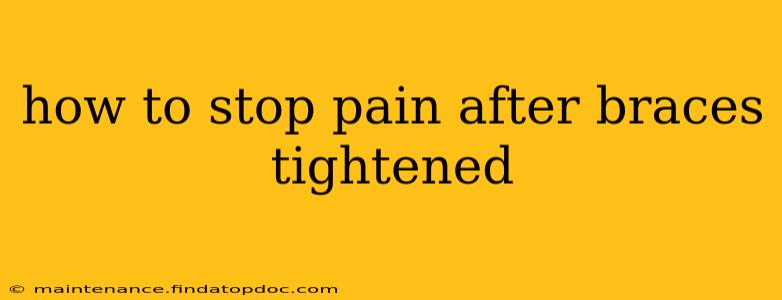Getting your braces tightened is a necessary step in achieving that perfect smile, but it often comes with some discomfort. The good news is that the pain is usually temporary, and there are several things you can do to manage it effectively. This guide will walk you through various methods to alleviate that post-tightening ache, answering common questions along the way.
What Causes the Pain After Braces Tightening?
The pain you feel after your braces are tightened is a result of the pressure your orthodontist applies to gently shift your teeth into the desired position. This pressure stimulates the periodontal ligaments—the tissues supporting your teeth—causing soreness and sometimes mild inflammation. It’s a sign that your treatment is working! The intensity of the pain can vary from person to person, depending on the individual's sensitivity and the amount of adjustment made during the appointment.
How Long Does the Pain Last After Braces Tightening?
Most people report that the most intense pain subsides within 2-3 days after their braces are tightened. While you might still feel some mild tenderness for a few more days after that, it should gradually decrease until it completely disappears. If the pain is severe or persists for longer than a week, it’s crucial to contact your orthodontist.
What are the Best Over-the-Counter Pain Relievers for Braces Pain?
Over-the-counter pain relievers like ibuprofen (Advil, Motrin) or acetaminophen (Tylenol) can be highly effective in managing the pain associated with braces tightening. Always follow the dosage instructions on the packaging and consult your doctor or orthodontist if you have any concerns or pre-existing medical conditions.
What are Some Home Remedies for Braces Pain?
Beyond medication, several home remedies can provide comfort and relief:
- Saltwater Rinse: Gently rinsing your mouth with warm saltwater several times a day can help soothe irritated gums and reduce inflammation. Dissolve half a teaspoon of salt in an 8-ounce glass of warm water.
- Cold Compress: Applying a cold compress or ice pack to the outside of your cheeks can numb the area and reduce swelling. Wrap the ice pack in a thin cloth to avoid direct contact with your skin.
- Soft Foods: Stick to soft foods like soup, yogurt, applesauce, and mashed potatoes for the first few days after your adjustment. Avoid anything hard, crunchy, or sticky that could irritate your braces or gums.
- Avoid Sugary Drinks: Sugary drinks can contribute to irritation and inflammation, so stick to water or other sugar-free beverages.
Can I Use Wax to Protect My Cheeks and Lips from Braces?
Yes! Orthodontic wax is a lifesaver for minimizing irritation from the brackets and wires. Apply a small amount of wax to the areas of your braces rubbing against your inner cheeks or lips. This creates a protective barrier, preventing sores and discomfort.
Is it Normal to Feel Pressure or Tightness After Braces Tightening?
Yes, feeling pressure or tightness is entirely normal. It's the pressure that moves your teeth. However, the pressure should not be excruciating. If it is, contact your orthodontist immediately.
When Should I Call My Orthodontist About Braces Pain?
Contact your orthodontist if:
- The pain is severe and doesn't respond to over-the-counter pain relief.
- You experience significant swelling or bleeding.
- You have any signs of infection, such as pus or fever.
- The pain lasts for more than a week.
How Can I Prevent Braces Pain After Tightening?
While you can't completely prevent the discomfort, taking proactive steps can help minimize it. Following your orthodontist's instructions, using orthodontic wax as needed, and maintaining good oral hygiene (brushing and flossing diligently) can all contribute to a more comfortable experience.
By following these tips and suggestions, you can effectively manage the pain and discomfort associated with braces tightening, enabling you to focus on achieving your dream smile. Remember, the temporary discomfort is a small price to pay for a beautiful, healthy, and straight set of teeth.
